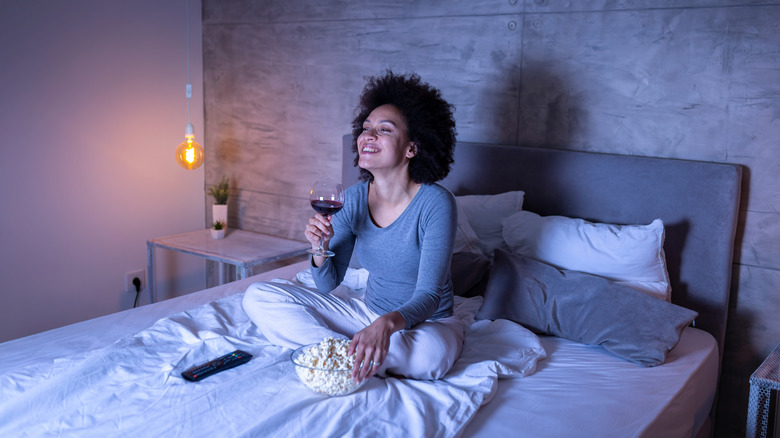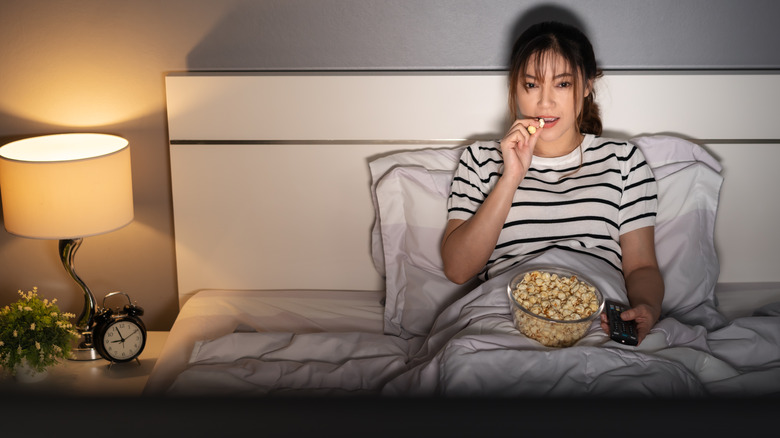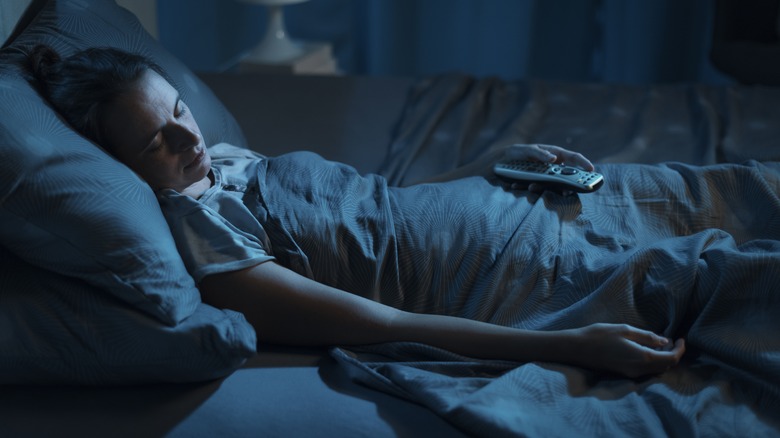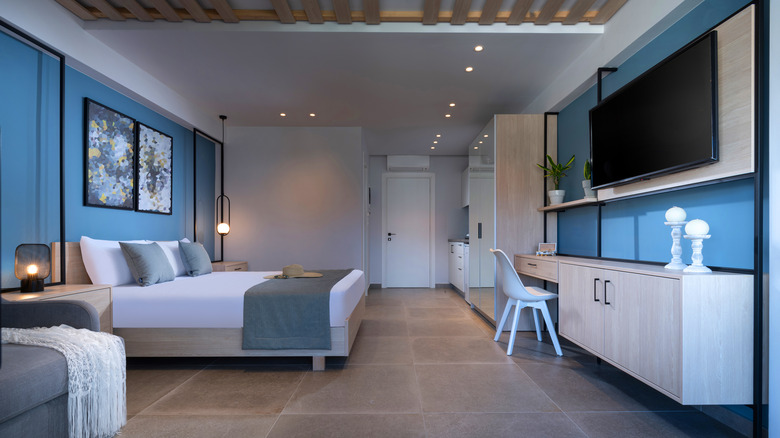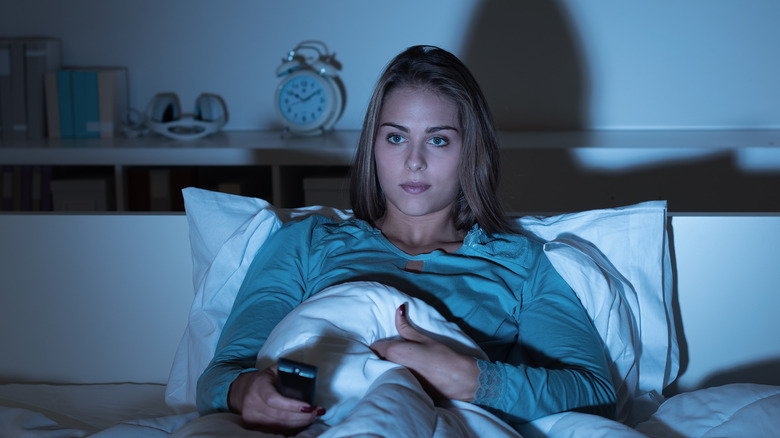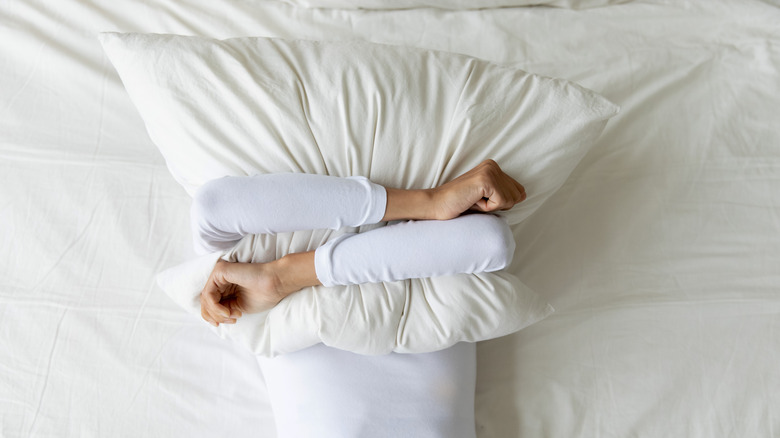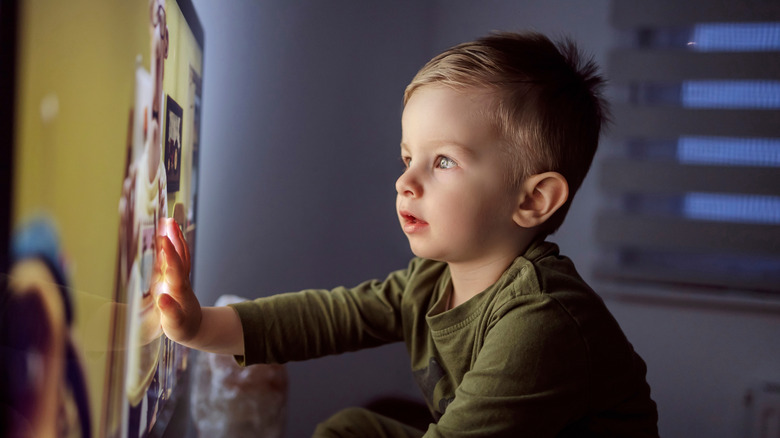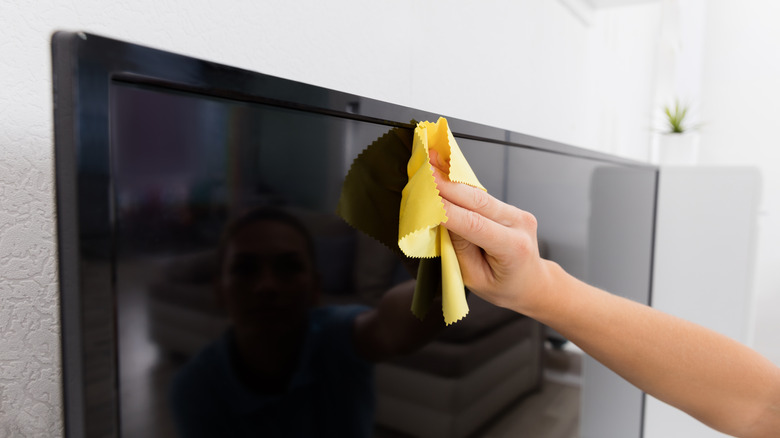Pros And Cons To Having A TV In The Bedroom
It's an age-old question, whether you're replacing your old version or moving into a new place and trying to configure and reconfigure: does a TV belong in the bedroom?
Some find that listening to what's on TV helps lull them to sleep, and equally can aid in waking them up in the morning instead of the harshness of a loud phone alarm. What better place to enjoy the final hours of the day than cozied up in your own room? Then there are some that see watching television late at night as a nighttime disturbance with the added detriment of affecting one's sleep cycle long term. Healthline cites a 2016 study that found that it can take up to four days to recover from just one hour's worth of lost sleep, and especially in today's bustling world, this time can be impossible to get back. Technology overall has become a topic of interest, as well as whether or not it even belongs in the bedroom when it's time to sleep. As Becoming Minimalist notes, tech in the bedroom may affect our sleep, relationships, and mindfulness.
You might be considering this choice for just you, your partner or your family and want to know the best solution. There are varied arguments across the board, and finding the resolution that fits best for you comes with its own bit of static.
Pro: A perfect time to catch up on shows or the news
We all lead busy lives. Sometimes there's not enough time to catch up on daily news updates, or watching your favorite shows or late night programs. Having a TV in the bedroom means a great, comfortable place to catch up on what you've missed that day, in terms of retention, and there's plenty of content out there to fill up your relaxing night time.
If you like catching up on news highlights, tuning in right before you turn in could actually be to your benefit. According to the London School of Business and Finance, research reports that studying before sleep can help consolidate your memory processing to peak levels, meaning that paying attention to news programs in bed can actually help you remember what you've watched.
Comfortably watching your favorite shows from your bed is hard to beat, and for those looking to get an even better sleep, there are a wide array of shows available to stream that are perfect to help you fall asleep. Screen Rant notes these shows can vary from true crime programs like "Unsolved Mysteries," purely wholesome episodic shows like "The Great British Baking Show," or beautifully-made nature documentary shows like "Our Planet." Whatever flavor of TV you like, there are some that will not only keep you relaxed and happy, but will aid in lulling you to sleep from the comfort of your cozy, relaxing bedroom.
Pro: A TV can act as a noise machine
Often people will say that having a TV on is like sleeping with a noise machine — it's something to fall asleep to. Many TVs today, especially Smart TVs, have the ability to play programs that actively aid in helping you sleep, just from noise alone.
Depending on where you're located and what your sleep needs are, having a TV act as your noise machine can help you sleep more soundly, whichever noise works best for you. There are a number of colored noises, white noise being the most common, which is mostly aligned with static and whirring noises. Pink noise, however, is a bit more soothing, and, according to Healthline, has been found to cause deeper sleep. If whatever you're watching is quieter content, like something with easy-going music or a show with low, soft dialogue, these "sleep sounds" can replicate pink noise, which naturally helps you drift off.
Soundproof Cow also notes that the best sounds that help you fall asleep are ones that are naturally non-threatening, such as running water, classical music, and nature. These sounds help to lower the heart rate and relax breathing — the stepping stones to falling into a deep sleep. Utilizing your TV to aid sleep can help tremendously, from playing relaxing nature programs or sleep videos on YouTube through your TV.
Pro: Everybody gets their preferred TV time
If your preferred activity or regimen is to watch a few episodes of your favorite show, but no one else is on board, a TV in the bedroom is an ideal situation where you, and everyone else, is happy.
Let's face it, not everyone might agree on what show to watch at night, or everyone's preferred late-night activities could clash against each other. One might prefer a quiet night in with a book, while others might like catching a laugh-out-loud comedy. With differences in opinion can come arguments and ultimately a sour experience; you're not alone. According to The Journal of Marriage and Family (JMF), published in 1976, family tensions have been caused by television watching for decades. Activities like studying, talking, eating, or just deciding what to watch can cause one, or everyone, annoyance.
A television in the bedroom can turn the tide to avoid such tensions. One of the top reasons to even have streaming services such as Netflix, Hulu, HBOMax, etc, is the ability to share accounts with separate profiles (via MakeUseOf). Why not do this for your own house? Catch your favorite shows or flicks from the comfort of your bed, without disrupting the rest of your household, or give the pickier cinephile in the family the ability to watch their own picks in their room. Everyone can enjoy what they like, arguing lessens, and the home is back to being happy.
Pro: Relationships get an added method of bonding
Bonding with loved ones over a show can lead to great experiences, whether it's with fun TV marathons or deeper connection over shared moments. At home, especially with your partner, having this shared social experience while in close quarters can help you gain a closer connection and bond in multiple ways, and can help you further develop your relationship.
Though we love to make fun of the colorful trend of "Netflix and Chill," chilling while enjoying shows you can watch on Netflix, particularly in the bedroom, has been seen to garner a better bond between you and your romantic partner. In a study done with over 200 college students, according to Psychology Today, data collected showed that sharing media with one's partner showcased greater feelings of commitment and closeness, and an overall better shared experience. These types of shared experiences can strengthen a relationship, as social confidence coach Jenna Purcell tells Rewire: "Watching television with others provides a place of common experience: shared 'show lingo,' inside jokes, and an easy way to be together without the demand to create your own entertainment or conversation."
As long as both are participating and interacting with one another, quality time is achieved and a deeper bond can develop.
Pro: The bedroom isn't just for sleep
Especially with the rise of work-from-home, we've had to create multifunctional spaces in rooms that were singular-purposed originally. When organized and designed accordingly, your bedroom can become more than just a place where you sleep; a gym, an office, a nursery, even a library.
As long as space allows, there is so much you can do with extra bedroom space, and more identities you can give the room as a whole. One being a gym, as the amount of at-home workout routines, machinery, and technology has grown significantly. Many of the best smart home gyms on the market today come with their own LCD or TV screens, to watch workout classes or Netflix, according to CNET.
Televisions can help redefine your bedroom and its multiple functions. A TV can delegate a separate living area in the bedroom, perhaps an area to work on hobbies, take calls, or spend time with family (via HGTV). Not only will this give the room added appeal, it can also make it feel as if you've gained an additional space altogether.
Con: Blue light emissions lead to vision and eye strain
Blue light usage is this generation's war on sitting too close to the television (which one should still avoid doing). If you spend too much time looking at screens, the blue light emitted from your TV, and your phone as well, can lead to a host of eye problems.
With the rise of smartphones and handheld devices, research into blue light's effects have shown negative, and potentially very harmful, results. The first level is merely with just digital eye strain, which leads to symptoms such as sore or irritated eyes and difficulty focusing, according to Prevent Blindness. Televisions also emit blue light, and especially at night, when it can be the only or main light source, this could result in even more strain.
The reason we get digital eye strain, according to the American Academy of Ophthalmology, is due to a decrease in how often we blink when looking at our TVs or devices. The "blink rate" is practically cut in half when we stare at screens, leading to drier eyes, headaches and more.
Con: It can lower your melatonin production
There are even more pressing problems related to blue light intake from watching TV in your bedroom, particularly its effects on melatonin production in the body. Exposure to light at night, including blue light, lessens the production of melatonin in the body, a hormone that influences our circadian sleep cycles and makes us feel drowsy before it's time to go to bed, according to the Sleep Foundation. Circadian rhythms are finely-tuned and blue light has been proven to affect their alignment, as we typically get the most intake of blue light from the sun. If your body still thinks it's daytime, your nighttime rhythms are bound to get thrown out of balance.
Stephen Lockley, a Harvard sleep researcher, also notes that light at night is part of the reason so many people don't get enough sleep; research has linked short sleep to increased risk for depression, as well as diabetes and cardiovascular problems (via Harvard Health Publishing). Though there are ways to lessen this by taking breaks, wearing blue-light glasses, etc., those become less important right before bed when all one wants to do is relax.
Con: Disturbing the delicate sleep cycle
Though you can try to pick something soothing to listen to, many of us listen to our television at fairly loud volumes — meaning that unless Netflix prompts you to turn off, it's likely your show can disturb your sleep. Studies show that regular exposure to sleep-interrupting noise can extend the duration of light-stage sleep, while reducing the quality and length of REM sleep, or a deeper, more restful sleep, according to Hoffman Audiology. These activities are not bad for just one night's sleep — studies show disturbed sleep can have both short and long term negative effects.
Whereas light can lessen the production of melatonin, research concludes that noise can increase your body's production of certain hormones, such as cortisol and adrenaline. Higher levels of these particular hormones can increase your heart rate and blood pressure (via Sleep Foundation). The short term effects can lead to sleepiness, irritability and poor mental health, while long term effects could develop into high blood pressure, obesity, and decreased health overall. Roughly two-thirds fall asleep with the TV on regularly, according to Eat This, Not That, and while there are potential ways to lessen the blow of noise at night by trying to limit your TV intake, this is pretty difficult to do once a pattern has formed.
Con: A dependency on TV can lead to bigger problems
Televisions don't just have to be kept in an adult or parent's bedroom, Kids can have this privilege as well. But the real question is, should they? Though it might seem like a scare tactic, younger age groups are more susceptible to the negative effects of too much TV time.
Watching TV in your bedroom, which can get harder to limit as one gets older, can lead to dependency on TV, which no matter your age can evolve into even worse conditions. A 2019 study found that children with televisions in their bedroom showed more unhealthy habits compared to those without, including overeating, poor sleeping and decreased sociability, as well as depression, negative self-esteem, and aggression, according to Science Daily.
Children that develop negative habits by staying up all night watching TV are not developing crucial social skills, which can also lead to larger problems down the road. "Establishing strong peer relationships, getting along well with others, and building a positive group social identity are essential elements in the successful transition to adolescence," says Linda Pagani, professor at the University of Montreal in Canada (via The Tribune India). Pagani and her team examined the televiewing habits of children at age 2, as well as the self-reported social experiences of these children at age 13, and found that children who watched a lot of television growing up were more likely to prefer solitude and adopt aggressive and antisocial behaviors.
Con: Overusage can lead to relationship problems
As Tina Hoang, research associate at the Northern California Institute for Research and Education, tells Los Angeles Times, "If we're spending so much time watching TV, it may be that we're not spending enough time doing other activities that would keep our brains healthy," whether it's exercising or socializing with people. The same can be said within relationships and couples who watch TV in bed. Though bonding over what you're watching can be a good thing, if used disproportionately, your television can have a larger, more negative presence than you might think.
One issue that can arise in relationships when the television is involved is binge watching, as the practice has a lot more to do with our emotions than we might think. Longwood University Biopsychology and Neuroscience professor Catherine Franssen says that binge watching happens when we become tied to a character or the story, leading us to further empathize and even become stressed over what happens in their lives. "Think of a roller coaster ride. It's fun because it stresses us out a little bit for a short period of time," she says (via Fatherly). However, when it comes to the bedroom, one partner might be engaging more in the show than with the person next to them, resulting in half listening or full on ignoring them, even using a show to avoid conversing, all of which are major problems within a marriage.
Con: Binge watching can push back your bedtime
Speaking of binge watching, a vital reason to avoid bringing a television into the bedroom is the "danger" of binge watching, and how this seamingly fun habit can actually be a huge time thief — even worse, time used for sleep.
According to The American Academy of Sleep Medicine, about 9 in 10 American adults have lost sleep because they stayed up to watch multiple episodes of a TV show or streaming series. And while this kind of marathon can be fun, it can be detrimental to one's health. The AASM also found that binge-watchers who postponed sleep reported more fatigue, more symptoms of insomnia, poorer sleep quality, and more difficulty falling asleep.
Having trouble falling asleep because of nighttime TV habits is no surprise, as clinical psychologist Dr. Richard Shuster tells Headspace. "In fact, research indicates that watching television for four hours prior to going to sleep can result in a reduction of REM sleep." Getting enough REM sleep is the difference between waking up refreshed or waking up more tired, and, most likely, later than before.
Con: Energy usage goes up, so will the charges
There is also a more eco-conscious argument that can be considered, as well. Though many TVs today are built more eco-consciously, energy usage is a prime example of when a TV should be limited to the living room. When you're extending your TV watch time from a few hours after the work day, to who knows how long you keep it on in the evening or overnight, this can run your bill up much higher than you might want.
Despite the growth in popularity of handheld devices over the years, according to Statista, the market for televisions has continued to grow, with over 70 percent of U.S. individuals having access to a smart TV. There are over 120 million TV homes in the United States for the 2019-2020 TV season alone, and the number is proposed to go up by 2025 to over 1 billion. With this increased use of televisions in the home comes the inevitable increase in energy usage, of which standard televisions can use around 234 watts per hour per device, according to IGS Energy. And while many televisions today run more energy efficiently, if you have multiple TVs in the home money isn't necessarily being saved, especially if you watch simultaneously or longer than the four-hour average.
Con: More dust means more cleaning
A black screen, coated with a layer of sticky static, is prime gathering ground for dust and allergens. More cleaning is not necessarily a con, but having another area where dust can gather, especially a place meant for rest and relaxation, is far from ideal.
With a majority of Americans owning or having access to smart TVs in their home, this means an added majority of LCD screens existing in homes across the country. These screens are common areas where dust can collect, and, as experts note, that's far from ideal from a health standpoint. Dust can no doubt trigger allergy symptoms, a common problem that singularly affects over 50 million Americans who experience various types of allergies each year, according to Buckets & Bows. Allergies can cause a wide range of symptoms, from itchy watery eyes and runny noses, to causing asthma attacks, hives, and breathing problems, not to mention remaining the sixth leading cause of chronic illness in the country.
Dust not only affects the health of a home's residents, but also the television and technology itself. The most severe and costly problem that can occur from collecting dust is short circuiting, according to Techwalla, as well as image quality and overall control issues. Smart TVs can cost hundreds to thousands of dollars, more if you've got one in the living room and one in the bedroom. You shouldn't lose out on quality issues just because of dust.
Pro & con: People like watching tv in bed much more than couches
No matter what side of the argument you're on, there's one fact that can't be argued: watching TV in bed is far more comfortable than watching on the couch. In fact, according to Market Watch, the bed has phased out the couch as the preferred spot to watch a TV for 60 percent of Americans. It has also been found to be more beneficial to fall asleep in bed first, as opposed to the couch and then relocating to bed.
Some of the drawbacks of falling asleep on the couch are based purely on its structure, noted by Living Spaces, as couches aren't created with the same support for the body in mind as a mattress. There are also many types of sleepers, from side and stomach sleepers to whose who can only fall asleep while flat on their back. A couch might have configurations that can work for one or two of these sleepers, but not for everyone.
Other negatives include limited space for co-sleeping, Therefore, it seems easy to cut out the middle step and watch TV in bed. However, as mentioned previously, although spending the final hours of your day from the comfort of your bed seems like a good idea, many experts find that keeping the bedroom free of distractions is better in general.
